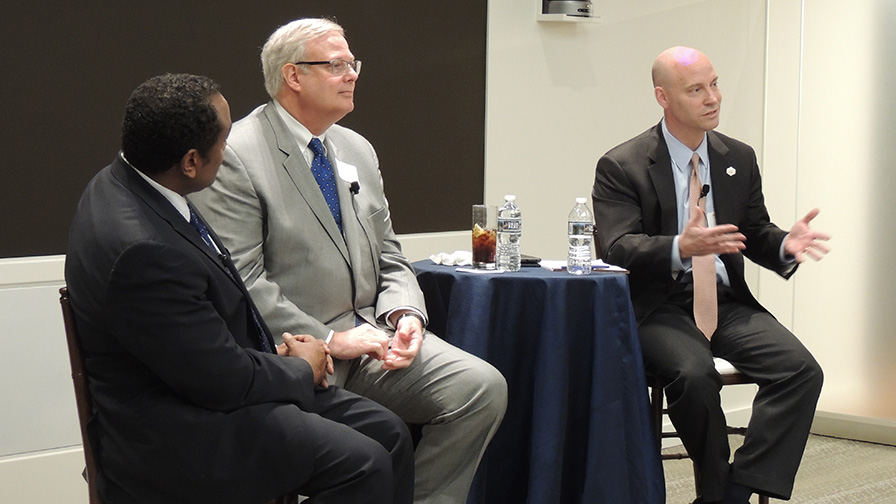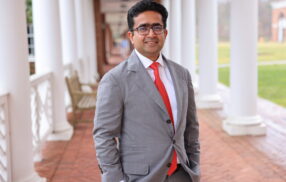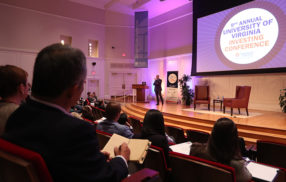
White House Director, GE Aviation Head of Government Relations Explain the Darden Advantage in Public Policy Careers
By Liz Jones
In the summer of 2016, the University of Virginia Darden School of Business opened its doors in the nation’s capital, where there is a high-powered intersection of public policy, business, politics and the democratic process.
Although Washington, D.C., is home to about 30 Fortune 1000 companies, many Darden graduates in the area have chosen to work in the government sector. Their decision raises two key questions: What draws graduates of a leading business school to the public side of the public-private sector intersection? And, in turn, does an MBA degree provide a platform of skills that are relevant and useful for effectively leading in the public sector?
To help shed light on these questions, the Darden Institute for Business in Society hosted a discussion on 7 March with two experienced Darden graduates — Marc Short (MBA ’04) and Peter Prowitt (MBA ’81) — at the offices of Sands Capital Management in Rosslyn, Virginia, where about 70 members of Darden’s alumni network gathered to hear the thoughts and perspectives of these two high-profile Darden MBA exponents.
Even in a city that’s known for its high-achievers, Short and Prowitt stand out. Their professional journeys have taken them to the heights of leadership in Washington’s challenging public-private sector ecosystem. A former Capitol Hill staffer, Short is a principal advisor to President Donald Trump and, as White House director of legislative affairs, serves as the Trump administration’s lead in guiding its agenda through Congress. As executive director of global government relations at GE Aviation, Prowitt is the primary architect of corporate strategy for an international provider of engines, components, and systems for commercial and military aircraft.
In a wide-ranging panel discussion moderated by Darden Professor Greg Fairchild (MBA ’92), Short and Prowitt examined the ins-and-outs of working within the intricate structures of the nation’s political and public policy power base. They explored the sometimes misunderstood link between government and the private sector, and discussed how the “business of politics” directly influences the “business of business” and the nation’s economy. They also discussed the sensitive and challenging job of consensus-building, advocacy and lobbying on behalf of political, business and public policy agendas.
In a city where change is a constant, they agreed that the ability to rapidly adapt to new situations and conditions was perhaps the most essential qualification for advancement in the public sector. Where the average tenure of a CEO may be eight to 10 years, the rhythms of government can be abrupt, with issues, programs and policies driven by a shifting roster of officials who arrive and depart with each election cycle.
Both attributed their ability to adapt to their experience at Darden and its role in preparing and shaping them for executive responsibilities.
Given that uncertain environment, Prowitt maintained that an MBA gives you “the ability to prioritize” and to “balance competing and rapidly changing demands” while providing practical “frames of reference for the intersection of business and government … and for competition and markets.”
Stating that it is “healthy to have business in government,” Short underscored the importance of diversity in education and experience, and the value-added perspective and balance it brings to organizations. He noted that, at the Cabinet level, the current administration is composed of many influential men and women from the business sector, adding that their focus on good management practices is reflective of what many Americans are looking for in government today.
While MBA grads might be found working in Congressional offices and committees, there was a significant number in the audience who were working in the executive branch. A question was posed as to how an MBA graduate can best serve within the scores of federal agencies and bureaus that deliver programs and services to the public. While acknowledging that government’s strict rules and regulations can sometimes make it difficult to showcase individual talents, Short emphasized the strengths that MBAs bring to their jobs: the management understanding and expertise that give them the skills to identify some “inefficiencies in government” as well as the optimal business practices that can help correct them.
Over the course of the evening, both men spoke in terms of the benefits of leadership writ large and emphasized the need for quality leadership and high-caliber management in all sectors of society, and at all levels. In making the case for more MBAs to consider the federal arena as a career option, both attested to its broad professional appeal and potential. Citing his own experience working for principal members of the House and Senate — including his service as chief-of-staff to then-Congressman Mike Pence — Short brought home the fact that an MBA degree “sets you apart in a town of lawyers.”
These two accomplished leaders conveyed to the audience that the business skill set, schooling and experience that Darden graduates possess are very much needed in the public sector today.
“[MBA graduates] are particularly well-suited for government,” Prowitt said. “We need sterling people in government” and, at Darden, “there’s a lot of sterling talent.”
The University of Virginia Darden School of Business prepares responsible global leaders through unparalleled transformational learning experiences. Darden’s graduate degree programs (MBA, MSBA and Ph.D.) and Executive Education & Lifelong Learning programs offered by the Darden School Foundation set the stage for a lifetime of career advancement and impact. Darden’s top-ranked faculty, renowned for teaching excellence, inspires and shapes modern business leadership worldwide through research, thought leadership and business publishing. Darden has Grounds in Charlottesville, Virginia, and the Washington, D.C., area and a global community that includes 18,000 alumni in 90 countries. Darden was established in 1955 at the University of Virginia, a top public university founded by Thomas Jefferson in 1819 in Charlottesville, Virginia.
Press Contact
Molly Mitchell
Associate Director of Content Marketing and Social Media
Darden School of Business
University of Virginia
MitchellM@darden.virginia.edu








